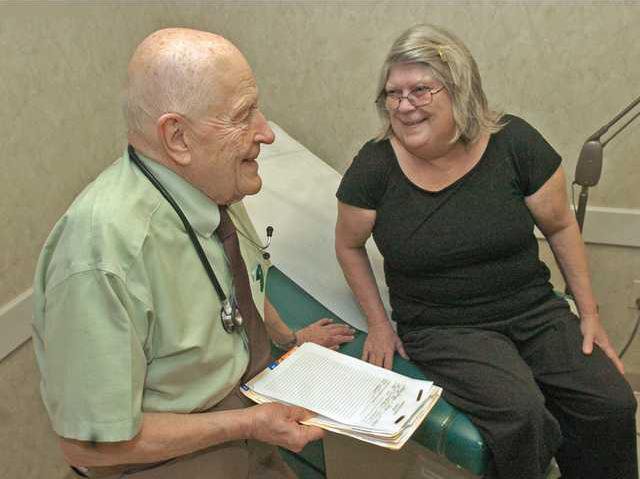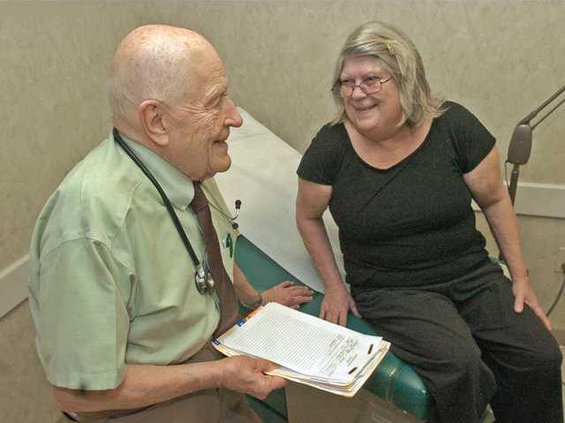Patricia Promise has what doctors call a "complex medical history."
The 41-year-old suffers from rheumatoid arthritis, high blood pressure and lupus, conditions that can carry a slew of other ailments, often reducing Promise's kidney function.
Her condition requires frequent visits to doctors and a steady dose of expensive medication.
On top of all that, Promise is one of about 25,000 to 30,000 uninsured Hall County residents. The unemployed Gainesville resident lost her medical insurance with her job several years ago.
Yet despite the ailments, Promise exudes an optimistic determination.
"I keep my spirits up," she said. "I don't give up because I still have a purpose."
Some of that hope comes from the help received through Hall County-based Good News Clinics, Georgia's largest free clinic, and Health Access Initiative, a coalition of specialist doctors who volunteer services.
Thanks to both organizations, Promise has been able to get primary care oversight and life-saving drugs from Good News as well specialized care from Health Access.
The two organizations, which have long collaborated as a safety net for uninsured patients, merged in January under the Good News name.
The change combines two organizations with overlapping missions into one that provides a wide spectrum of medical services to an ever-increasing demand.
The merger is bringing together 46 volunteer physicians and 42 dentists from Good News with more than 200 specialist volunteers from Health Access — not to mention dozens of other medical volunteers for both programs — into one consolidated organization.
Cheryl Christian, Good News' executive director, believes the merger makes it the only free clinic in the country to provide this breadth of primary, dental and specialist medical care.
Good News Clinics has been offering free medical care for nearly 20 years, aiding uninsured Hall County residents whose income falls below 150 percent of the federal poverty level and who are not eligible for Peachcare, Medicare or Medicaid.
The program has been touted as a huge success, thanks to an impressive list of volunteer physicians, including some of Gainesville's best doctors; strong support from the community; and its partnerships within the medical community, which has led to funding and logistical support from Northeast Georgia Medical Center. The hospital contributed more than $260,000 to Good News budget last year, as well as equipment and hospital space for in-patient surgery.
Thanks its wide base of cooperation, Good News touts a total estimated value of services delivered to the uninsured at $14.5 million on a budget of only $1 million.
"They are not only a state model for how it's done, they are a national model," said Donna Looper, executive director of the Georgia Charitable Care Network, which advises free or discounted clinics statewide.
While there always has been a need for such programs in Hall County, that need has only increased in recent years, Christian said.
"With the downturn in the economy, of course we have had more applicants," she said. "We're seeing people who have always had health insurance who lost their jobs."
Many are ages 50 and older, and held steady jobs for 25-plus years.
"If we were not here for many of our patients, the only option would be the emergency room," Christian said.
Experts say emergency room care is not more costly, but it typically offers less favorable outcomes than planned care.
Health Access Initiative was started in the late 1990s to fill gaps in the existing medical safety net in Hall County. The program created a coalition of volunteer specialists, from anesthesiologists to urologists, also available for the uninsured.
Before Health Access, speciality care for uninsured patients was "done on a buddy system," said Dr. Jack Chapman, a Gainesville ophthalmologist and president of Health Access' board before the merger.
By that, Chapman means that doctors would call the specialists they knew to find care for patients. Health Access, with a central office to coordinate care, streamlined that process and brought more doctors into the fold, Chapman said.
That kind of streamlining is expected to only improve with the merger, allowing Good News Clinics to coordinate a breadth of resources.
Christian said the change will also allow for better use of resources and eliminate any competition for charitable funding.
"It's not like our services are unlimited," said Christian. "We want to make sure we are seeing the patients who need the care the most, first."
Tracy Vardeman, vice president for strategic planning at the medical center, said she sees the new Good News Clinics as a combination of some already "hallmark programs."
"Both programs were successful independently," said Vardeman. "I can't imagine they would be any less than successful. They would only make each other stronger."




